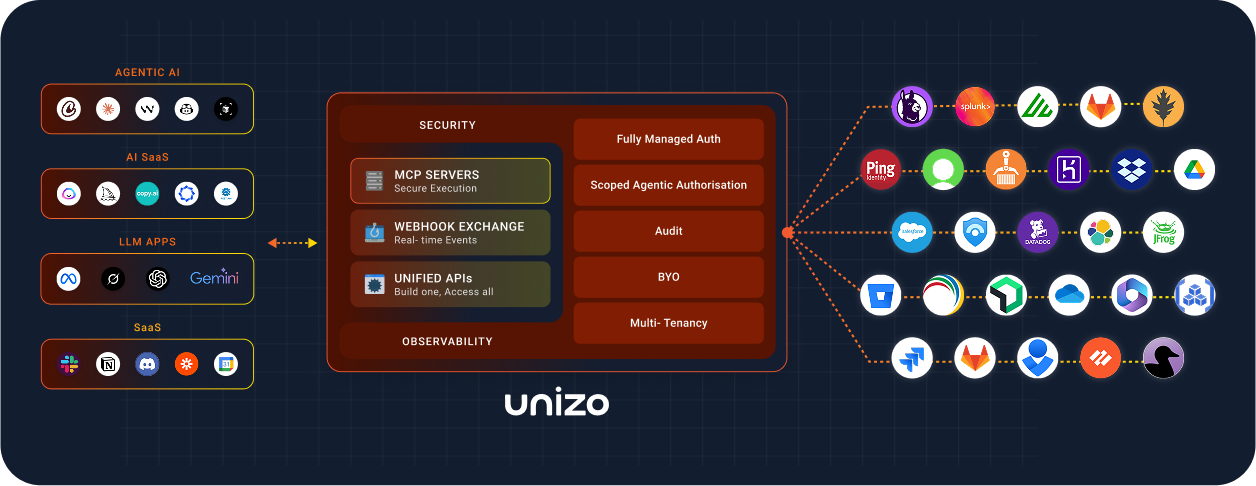“Why” – The Hidden Bottleneck in Modern Software
If you’re building cybersecurity, IT Ops or DevOps products today, integrations are no longer optional; they’re product-critical. Whether you’re offering a SAST engine, a CSPM dashboard, an identity governance platform, or an AI-driven incident responder, your product must plug into the tools your customers already use.
But integration work is slow, repetitive, brittle, and expensive. Engineering teams waste months building and maintaining one-off connectors that don’t scale and are impossible to monitor. Building 10 integrations is hard. Building 50+ is an unsolved problem unless integrations are treated as infrastructure.
Meet Unizo’s Integration Fabric – Infrastructure for Multiplexed Integrations in AI Era
Unizo provides programmable integration infrastructure that moves integrations out of your codebase and into scalable infrastructure.
Instead of owning every connector, API variation, rate-limit handler, and webhook receiver, you plug your product into the Fabric once. It does the rest including handling secure connectivity, real-time data flow, observability, and lifecycle management across wide range of categories of tools.
We built Unizo to support the needs of both traditional enterprise software and Agentic AI systems that reason, adapt, and act on enterprise data.
How It Works: Multiplexed Integration Infrastructure
Unizo is composed of interoperable, purpose-built components that come together to deliver production-grade integrations fast, scalable, and secure. Here’s how the pieces work together:
MCP Server (Model Context Protocol)
A key part of the fabric is
fully-managed MCP Server that acts as the secure, context-aware bridge between agentic AI systems and integrated enterprise tools.
Unlike standard or open-source MCP servers, Unizo’s implementation is:
- Multi-tenant by design, ensuring strict tenant isolation across all calls
- Context-scoped, meaning AI agents only access data and actions they’re explicitly authorized for
- Fully observable, with structured logging, tracing, and auditability for every invocation
- Seamlessly integrated with Agent Auth, so agents don’t manage raw credentials
This infrastructure allows AI agents to retrieve real-time context or trigger secure actions across 3rd-party systems without risking cross-tenant leakage, token sprawl, or observability blind spots.
Unizo’s MCP Server is available as a hosted endpoint across leading AI platforms and frameworks including Claude, Windsurf, CrewAI, LangGraph, so developers can start integrating immediately with minimal configuration. By embedding deeply into these systems, Unizo’s MCP Server makes it trivial to wire enterprise-grade integrations into LLM-native products: with security, control, and speed baked in.
Webhook Exchange
Unizo’s
Webhook Exchange powers real-time event delivery across your integrations: no polling, no queues to maintain, no custom schedulers.
It abstracts the complexity of event handling by managing retries, deduplication, payload transformation, delivery ordering, and tenant-level isolation. This ensures consistent, low-latency performance, even at scale.
Whether you’re triggering downstream workflows, syncing context into AI agents, or reacting to signals across integrated systems, the Webhook Exchange gives you a robust, fault-tolerant foundation for event-driven product behavior.
Unified APIs & Normalized Schemas
Unizo offers category-level
Unified APIs covering domains like EDR, SCM, Identity, Ticketing, and more; backed by robust, normalized data models. You build once, and Unizo fans out across 100+ supported tools handling pagination, retries, rate limits, versioning, and edge-case quirks for you.
What sets Unizo apart is the balance between standardization and flexibility. Our schemas provide consistent, normalized structures across tools in each category but they’re also customizable, so you can:
- Extend fields to suit your product’s unique data needs
- Map custom vendor fields for advanced scenarios
- Choose to access and work with tool’s response schema, if ever needed
This lets you scale integrations across
100+ tools without sacrificing control or product-specific fidelity critical for enterprise and AI-driven use cases alike.
Connect UI
Connect UI is a drop-in frontend component that embeds directly into your product, allowing users to securely discover, configure, and authenticate integrations in just a few clicks.
It completely abstracts away the complexity of auth schemes – OAuth, API keys, custom flows and shields your team from edge cases, refresh logic, and token management pitfalls.
Fully customizable and enterprise-ready, Connect UI fits your brand while delivering a seamless experience across 100+ integrations.
Agent Auth (Seamless Authentication Manager)
Agent Auth is a seamless authentication manager purpose-built for agentic systems. It handles secure, scoped credential flows so your agents never deal with raw tokens directly.
Behind the scenes, it manages provisioning, token refresh, and lifecycle operations, enabling AI-driven systems to safely act on behalf of tenants with zero exposure and full access control.
SDKs & Developer Tooling
Unizo provides
SDKs, CLI tools, workflow templates, and implementation guides to help you build, test, and manage integrations efficiently, whether you’re a solo founder, small team or part of a scaled engineering team.
Our
tooling supports both traditional integration workflows and AI-native use cases, with features tailored for agentic systems, including:
- Scoped invocation patterns for AI agents
- MCP-compliant request/response formats
- Schema-aware helpers for unified APIs
- Event-driven workflows powered by webhook exchange
- Testing utilities for simulating multi-tenant agent behavior
These tools are designed to work seamlessly with Unizo’s infrastructure, enabling you to build and ship secure, observable, and scalable integrations into enterprise and LLM-native environments with minimal lift.
Observability & Issue Detection
Unizo gives you deep,
real-time visibility into every integration—with no custom monitoring required. Dashboards, structured logs, event timelines, and error tracing help your team identify auth issues, rate-limit problems, performance degradation, and integration-specific failures.
Beyond debugging, Unizo surfaces insights on integration usage that can inform product decisions, prioritize roadmap investments, and highlight underutilized features.
With built-in alerts and health indicators, your team can proactively detect and resolve issues—preventing failures before they impact customers.
Why “Fabric”?
We call it a
fabric because Unizo is more than just a gateway, SDK, or middleware. It’s a
programmable, multiplexed mesh that routes, manages, and secures connectivity across many tools, tenants, and workflows—from a single control plane.
Like a true fabric, it weaves together disparate systems into a unified integration layer abstracting complexity while preserving control, observability, and scale.
Unizo becomes a foundational layer of infrastructure for modern software, especially in an era where integrations aren’t an afterthought, but a core part of the product experience.
Who It’s For
Unizo is built for software vendors who deliver enterprise-grade products in complex, integration-heavy domains especially where speed, security, and scalability matter. We’re purpose-built for teams building:
- Application Security (SAST, SCA, ASPM, container scanning)
- Cloud Security & CSPM platforms
- Identity, Governance, and GRC automation
- Agentic AI systems for SecOps, compliance, and infrastructure reasoning
- CI/CD orchestration and DevOps intelligence
- Any product that needs to connect with 10, 20, or 50+ enterprise tools without rewriting the wheel every time
If integrations are slowing down your roadmap, eating up engineering cycles, or limiting AI-driven workflows, Unizo was built to solve that.
Free Trials Are Now Live
You can now try the Unizo Fabric for free. Build real integrations, test across tools, and see how infrastructure-driven integrations change your roadmap.
👉
Start your free trial
Early-stage teams: ask us about our startup program and early access to upcoming AI-native integration features.

